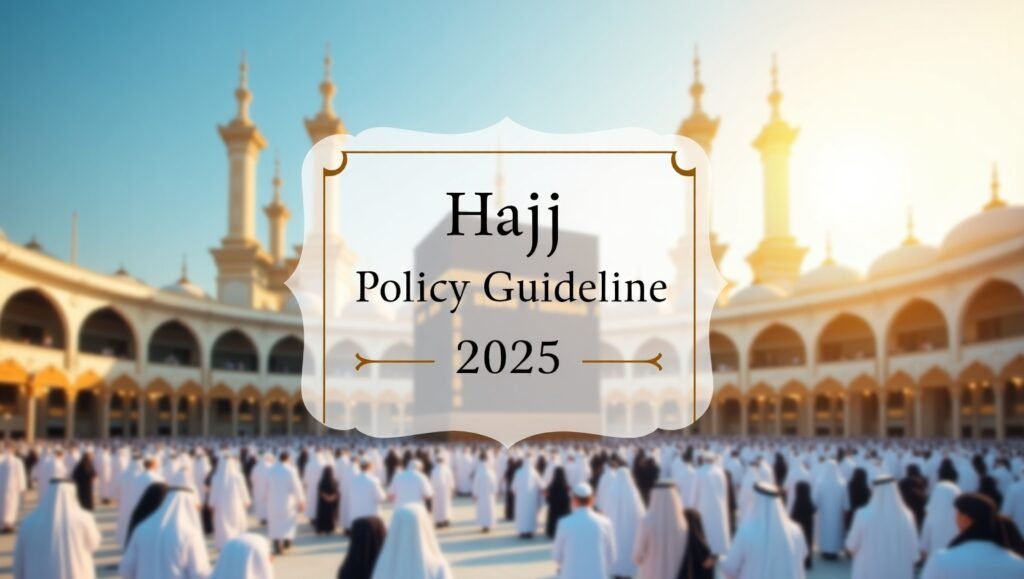- What Are the New Hajj 2025 Rules?
- Entry Restrictions to Makkah
- Health and Safety Measures
- Penalties for Visa Overstay
- Digital Application Process
- First-Time Pilgrims' Priority
- Things Not to Do During Hajj 2025
- Engaging in Disputes or Arguments
- Hajj 2025 Travel Checklist
- Documents Required for hajj 2025
- How many total Hajj quotas for 2025?
- Global Hajj Quota Overview
- United States Hajj Quota Details
- United Kingdom Hajj Quota Details
- India's Hajj Quota Details
- Pakistan's Hajj Quota Details
- Quota Allocation Criteria
- What are the 4 requirements for Hajj?
- How Many People Will Perform Hajj in 2025?
The Hajj, one of Islam’s five pillars, is a religious duty that Muslims should undertake, if they can afford it, at least once in their lifetime. UP TO 2025: We have issued new policies, instructions, and guidance to ensure a safe and well-organized Hajj pilgrimage. This guide outlines the essential details of Hajj 2025, such as visa regulations, health prerequisites, items not allowed to carry, and how to prepare for Hajj 2025.
What Are the New Hajj 2025 Rules?
The Saudi government has recently implemented several guidelines as they prepare for the 2025 Hajj to ensure a safe, secure, and well-organized pilgrimage. The following is a summary of the significant updates:
Mandatory Hajj Permit
Requirement: The pilgrimage will not be valid unless an official Hajj permit is obtained from designated channels, such as the “Nusuk” portal.
Penalties: You can be fined up to 20,000 SR (around ₹4.5 lakh) if you do Hajj without a proper permit. Anyone caught helping pilgrims without authorization may be fined up to 100,000 riyals (approximately ₹22.7 lakh).
Age Restrictions
Minimum age: Children under the age of 12 will not be able to perform the Hajj in 2025. This provides a safety valve for worshippers who were attending these giant gatherings.
Visa Regulations
Single-Entry Visas: Pilgrims from as many as 14 countries, including India, Bangladesh, Pakistan, and Egypt, will only be allowed to obtain single-entry visas for 30 days. This policy is to disallow unauthorized pilgrims and control their rush.
Visa Validity: All Hajj visas are valid only for travel to Saudi Arabia for the purpose of Hajj, and no other travel will be permitted.
Entry Restrictions to Makkah
Requirement: Starting April 23, 2025, the entry permit is mandatory for all pilgrims entering Makkah, whether Saudi citizens or expatriates.
Exceptions: Only individuals with Hajj permits, Makkah residents who can provide proof of residence, and those with permits to work in the holy sites will be allowed in during the Hajj season.
Health and Safety Measures
Vaccines: Pilgrims must be immunized against COVID-19, meningitis, and influenza. They must prove their vaccination while applying for a visa.
Health Certificates: A health certificate from a licensed veterinarian stating that the dog is in good health with up-to-date shots is required.
Penalties for Visa Overstay
Heavy hand: Violating the Hajj visa’s terms can result in deportation, fines as high as SAR 50,000 (USD 13,000), and a prison sentence of up to 6 months. Holders of Umrah and visit visas who overstay in the Kingdom face these violations.
Digital Application Process
Nusuk Platform: The official Nusuk platform will receive all requests for Hajj 2025. This centralization process helps streamline the application process and provides authenticity.
First-Time Pilgrims’ Priority
Quota Creation: To have deeper penetration in the community, first-time pilgrims will receive priority. Recurring pilgrims may face restrictions or other conditions.
Things Not to Do During Hajj 2025
The pilgrimage, a spiritual time, is taken up with respect, discipline, and following certain routines. Flouting laws or practicing certain activities may disrupt the holiness of the pilgrimage or be the cause of punishments. Here are some things to avoid during Hajj 2025 and the sources of the knowledge.
Engaging in Disputes or Arguments
Hajj is a time for patience, peace, and worship. Engaging in unnecessary disputes, arguments, or confrontations contradicts the spirit of Hajj.
- Islamic Perspective: The Quran states, “For Hajj are the months well-known…there should be no obscenity, nor wickedness, nor wrangling in the Hajj” (Surah Al-Baqarah 2:197).
Carrying Prohibited Items
Certain items are strictly prohibited for safety and compliance:
- Firearms or sharp objects.
- Alcohol, illegal drugs, or other banned substances.
- Plastics and environmentally harmful materials.
Violation can lead to severe penalties, including fines or legal action.
Overloading Luggage
Following baggage limits is essential to prevent traveler discomfort or delays. If baggage limits are exceeded, you may experience some inconvenience during the Haj.
Ignoring Ihram Restrictions
When the pilgrim is in ihram:
- Avoid cutting nails or hair.
- Avoid using cologne or scented items.
- There were no relations or flirtations with the wife.
These limitations keep the pilgrims’ attention focused on worship and humility.
We are ignoring the local ways and the local rulers.
- Pilgrims should be mindful of Saudi Arabia’s cultural and legal system.
- Failure to abide by local laws (some areas prohibit photography, for example) can result in the confiscation of equipment or worse.
Rituals Done Wrong
Pilgrims are supposed to be aware of the proper process for doing things such as
- Tawaf is the ritual of circumambulating the Kaaba.
- between Safa and Marwah (Ch LAth.9).
- And throwing pebbles at the Jamaraat.
Ritual mistakes also may need supplementary actions, like a sacrifice.
Undermining of health and safety regulations
Pilgrims will have to follow health standards that include:
- People often wear masks in crowded places.
- It’s essential to stay hydrated and avoid succumbing to heat exhaustion.
- Adhering to vaccination schedules for COVID-19, meningitis, and influenza.
Violating these regulations could lead to sickness or penalties.
Throwing Trash or Ignoring the Green Rules
Hajj 2025 prioritizes sustainability. Pilgrims must
- Dispose of waste in assigned jars.
- Avoid single-use plastics.
Get involved in green activities at all opportunities.
The infractions can carry fines.
Miqat of hajj and umrah
https://travelinmakkah.com/miqat-of-hajj-and-umrah/
Hajj 2025 Travel Checklist
Hajj and Umrah are necessary Islamic acts of worship. It’s crucial to be well-prepared before setting out on these sacred journeys. It can be challenging to carry out these rituals (as others have done) unprepared.
For more details about the Hajj and Umrah checklist, visit the link below.
https://travelinmakkah.com/checklist-for-hajj-and-umrah/
Documents Required for hajj 2025
Required Documents
- You must hold a passport valid for at least six months.
- I applied for the visa on the Hajj portal, but it was all in vain.
- The vaccination record includes COVID-19, meningitis, and yellow fever, as required.
- You must provide proof of financial ability to pay for Hajj.
For more details about the Hajj and Umrah checklist, visit the link below.
https://travelinmakkah.com/what-document-need-for-hajj-or-umrah/
How many total Hajj quotas for 2025?
Hajj is one of the world’s largest annual religious mass gatherings, and its successful management relies on detailed planning and organization. To manage the number of pilgrims and maintain safety, the Kingdom of Saudi Arabia grants a fixed quota for each country, which is determined by variables like the country’s Muslim population.
Global Hajj Quota Overview
The Kingdom has earmarked 1,372,482 pilgrims from all over the world to perform Hajj 2025. The Kingdom continues its quest to accommodate all pilgrims safely and logistically through this distribution. The quotas are assigned according to the country’s Muslim population, as well as that country’s geographical size.
Country-Specific Quotas
The following are among the more prominent country-specific Hajj 2025 quotas:
- Indonesia: 221,000 pilgrims
- Pakistan: 179,210 pilgrims
- India: 175,025 pilgrims
- Bangladesh: 127,198 pilgrims
- Nigeria: 95,000 pilgrims
- Iran: 87,550 pilgrims
United States Hajj Quota Details
Total Quota: 9,504 pilgrims
The U.S. quota for the Hajj 2025 will be 9,504 pilgrims. This limitation is a measure that the Kingdom of Saudi Arabia has taken to efficiently organize the pilgrimage. And be aware that this limit was met fairly rapidly in the first weeks of registration. However, extra opportunities could come in later tranches if other countries fail to fill their quotas.
United Kingdom Hajj Quota Details
Total Quota: 12,348 pilgrims
A quota of 12,348 Hajj pilgrims has been assigned to the UK for Hajj 2025. This quota caters to the increasing number of British Muslims who want to go for Hajj. Similar to other nations, the initial registrants quickly filled the quota. We also urge pilgrims to continue following up on other announcements later.
Important Considerations
- All participants must register on the official Nusuk Hajj site.
- Registration occurs in phases. Early stages can fill up quickly, but if other countries fail to take their full allocation, further places may become available later.
- Keep informed. Pilgrims are advised to visit official portals and authorized Hajj operators for information on the quota and registration process.
India’s Hajj Quota Details
The Hajj quota for India in 2025 stands at 175,025; previous years’ quotas were lower. The Hajj Committee of India shares this quota with 122,518 pilgrims, representing a maximum of 70% of the total.
Private Tour Operators: 52,507 pilgrims (30 percent)
However, logistical issues and some private tour operators’ inability to meet deadlines threatened to leave many pilgrims behind. When the Indian government intervened, Saudi Arabia eventually accepted 10,000 more Indian pilgrims, meaning more devotees could perform the pilgrimage.
Pakistan’s Hajj Quota Details
Pakistan has also received a quota of 179,210 pilgrims for the Hajj in 2025. The government and private schemes have divided this allocation in half. Saudi Arabia has also given Pakistan an additional 10,000 places in the private scheme, taking the overall number of Pakistani pilgrims to roughly 189,210.
Quota Allocation Criteria
Saudi authorities set Hajj quotas according to a gradual formula based on each country’s Muslim population. The usual quota is for the Muslims of each country to send one pilgrim per 1,000 people. However, other considerations, such as bilateral agreements, capacity of infrastructure, and health concerns, may determine the final figures.
What are the 4 requirements for Hajj?
Performing Hajj is a profound spiritual journey in Islam, and it is obligatory under specific conditions. While various scholars have outlined these prerequisites, the most widely accepted conditions are:
- Being Muslim: Only Muslims are required to perform Hajj.
- Reaching Puberty: The individual must have reached the age of maturity.
- Mental Soundness: The person must be of sound mind.
- Financial and Physical Ability: The individual must possess the financial means and physical capability to undertake the journey.
These conditions ensure that the individual is spiritually, mentally, and physically prepared for the pilgrimage. Those who do not meet these criteria are not obligated to perform Hajj.
How Many People Will Perform Hajj in 2025?
Saudi Arabia is gearing up to host 1.8 million pilgrims for Hajj in 2025. This year’s pilgrimage is projected to be the last summer Hajj until 2042 because the Hajj season will move to the winter based on solar and lunar calendars.
The pilgrimage is a significant event for Muslims around the world who make the journey to Mecca. The Saudi authorities are exerting their utmost efforts to keep the pilgrims safe and comfortable as they make their way to this inviolable and revered place of worship.
How Do I Apply for Hajj 2025?
Applications are made through the online Hajj portal and through licensed travel agents.
What Are the New Laws of Hajj 2025?
Among the key rules are mandatory vaccinations, advanced digital visa rules, and environmentally sound practices.
What is the total quota for Hajj 2025?
The global quota is 2.5 million pilgrims with a country-wise distribution.
How Much Does it Cost to Go to Hajj 2025?
Prices vary per package between $5000 and USD 12000.
How Many Times Can I Perform Hajj?
You may only perform Hajj once every five years unless you accompany a first-timer.
Is It Allowed to Wear Perfume on Hajj?
No, you cannot wear perfumed products during Ihram.



